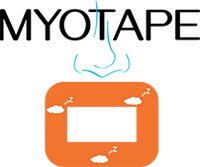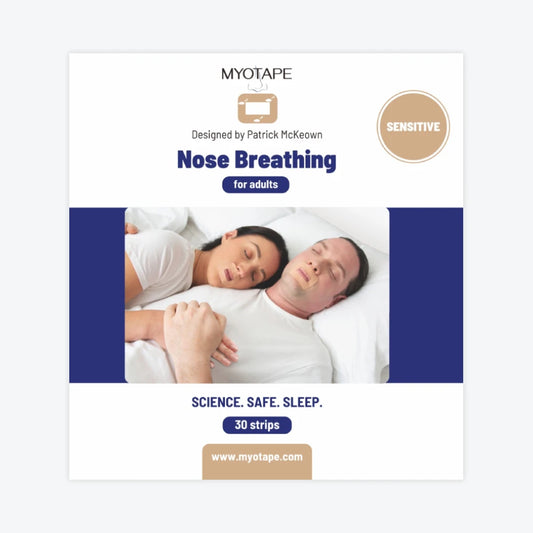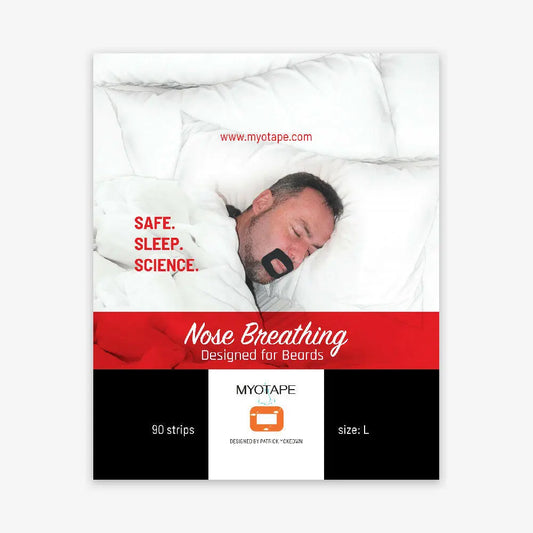CPAP therapy is supposed to help you breathe easier and sleep better, not leave you waking up with a dry mouth or throat. Yet for many people, that’s precisely what happens.
If you’ve been wondering why your CPAP machine is making your mouth dry, you’re in the right place to get the answer.
In this article, we’ll also walk through seven easy ways to stop CPAP dry mouth so you can sleep comfortably again.
What Causes CPAP Dry Mouth?
A CPAP machine (Continuous Positive Airway Pressure) helps people with obstructive sleep apnea (OSA) breathe more easily at night. It delivers a steady flow of air through a mask to keep the airway open and prevent snoring or pauses in breathing.
While CPAP therapy improves sleep and overall health, many users wake up with a dry mouth, even with the humidifier on. The answer often comes down to how air moves and escapes during sleep.
Here are the causes of dry mouth from CPAP and why it happens.
Mouth breathing during sleep
Mouth breathing is the most common cause of CPAP dry mouth. When your mouth opens, the pressurized air escapes instead of reaching your airway. This dries out your mouth and reduces the effectiveness of your CPAP.
Encouraging nasal breathing, for example, with MyoTape, helps keep the air where it belongs and makes sleep more comfortable.
Mask leaks
If your mask does not fit properly, air can leak out around the edges. These leaks dry your mouth and reduce the effectiveness of your therapy.
Low humidifier settings or dry room air
You can still have a dry mouth even with a CPAP humidifier due to your humidity level. When the air from your CPAP is too dry, it can quickly remove moisture from your mouth and throat.
Nasal congestion or allergies
Blocked nasal passages make it harder to breathe through your nose, which often leads to mouth breathing and dryness.
Dehydration or medications
Sometimes the cause is not your CPAP at all. Dehydration, caffeine, alcohol, or certain medications, such as antihistamines, antidepressants, and blood pressure drugs, can reduce saliva production and worsen dryness.
Ask your doctor or pharmacist if a dry mouth could be a side effect of your medication.
Now that you know what causes dry mouth using CPAP, let’s look at some simple ways to stop it and sleep comfortably again.

7 Ways to Stop CPAP Dry Mouth
Did you know that dry mouth is one of the reasons for low CPAP adherence? Here are seven practical ways to prevent dry mouth:
1. Try mouth taping with MyoTape
For many CPAP users, mouth breathing is the main reason for dryness during sleep.
When your mouth opens, pressurized air escapes rather than reaching your airway, leaving your mouth dry and your therapy less effective.
MyoTape offers a simple and gentle way to keep your lips closed and encourage nasal breathing.
It is made from soft, skin-friendly material that supports your lips without discomfort or restricting breathing.
Unlike chin straps, which can feel tight or cause jaw pain, MyoTape lets you breathe naturally through your nose while using your CPAP machine.
Furthermore, it allows for mouth puffing, which is important for people with sleep apnea, and works well with CPAP therapy.
It also helps maintain moisture in your mouth, improves comfort, and supports better oxygenation.
2. Adjust your CPAP humidifier and pressure settings
If your mouth still feels dry even with the humidifier on, your humidity or pressure settings may need adjustment. Increasing humidity adds moisture to the air, helping prevent dryness.
Experiment with different humidity levels until the air feels comfortable. Heated tubing can also help maintain consistent moisture throughout the night.
If your air pressure feels too strong, it can cause small leaks that worsen dryness. Consult your sleep specialist to fine-tune your pressure settings for better comfort.
Keeping your bedroom air moderately humid can equally help reduce dryness and make your CPAP therapy more effective.
3. Use a heated tube or climate control feature
Another tip to prevent dry mouth from your CPAP is to check whether your machine includes a heated tube or climate control feature.
Heated tubing keeps the air warm and stable, preventing condensation and dryness.
Consistent humidity helps protect your mouth and throat from drying out while you sleep.
Many modern CPAP machines include an automatic climate control option that adjusts humidity levels for you.
4. Check for mask fit and air leaks
Even small air leaks can cause dryness and reduce the effectiveness of your treatment.
If you wake up with a dry mouth after using CPAP, your mask may not be sealing properly.
Check your mask straps and cushions to ensure a snug but comfortable fit. Clean or replace worn-out parts regularly, as old cushions can lose their seal.
If leaks continue, ask your equipment provider or sleep technician for help adjusting your mask.
A proper fit maintains consistent airflow and prevents dryness.
5. Stay hydrated always
If you want to know what helps with dry mouth while using CPAP, start by staying hydrated. Drink plenty of water throughout the day and a bit before bed to support natural saliva flow.
A room humidifier can add moisture to the air, especially in dry climates or during winter.
Saliva substitutes, gels, or mouth sprays before sleep can also relieve dryness.
Avoid alcohol, caffeine, and smoking, as they can make dry mouth worse.
6. Address nasal congestion or allergies
When your nose is blocked, you are more likely to breathe through your mouth, which leads to dryness.
Clear your nose before bed with a saline rinse or nasal spray. Manage allergies with your doctor’s guidance to keep your nasal passages open.
You can also practice Buteyko Breathing Exercises, which help open the nasal airways naturally and make nasal breathing easier over time.
Combining these techniques with MyoTape encourages healthy nasal breathing, helps prevent dry mouth, and improves your overall CPAP experience.
7. Check your medications
Sometimes the cause of dry mouth is not the CPAP machine itself.
Certain medications, such as antihistamines, antidepressants, and blood pressure medications, can reduce saliva production and cause dry mouth.
Read the product insert or ask your healthcare provider if dry mouth is a side effect. If it is, your doctor may adjust your dosage or recommend an alternative medication.
Managing medication-related dryness can significantly improve your comfort and help you stay consistent with your CPAP therapy.
Choose MyoTape to Stop CPAP Dry Mouth and Sleep Better
Dry mouth can make CPAP therapy uncomfortable, but it does not have to stay that way. Once you follow the simple steps discussed above, you will transform your experience. Nonetheless, supporting nasal breathing is often the key to lasting relief.
That is where MyoTape can help. It gently encourages nasal breathing, keeps your lips closed without discomfort, and enables you to wake up with a moist mouth and deeper, restful sleep.
Thousands of CPAP users say MyoTape not only prevents dryness but also helps them sleep longer and feel more refreshed in the morning.
''I recently started using CPAP and was having a lot of difficulty adjusting... I would wake up choking from a dry mouth and throat... I found MyoTape while researching mouth tape and decided to give it a try... MyoTape has nearly stopped my waking up during the night due to dry mouth, so I am assuming that it is doing its job!'' - Karen
If you are ready to stop waking up with a dry mouth and start enjoying your CPAP therapy again, try MyoTape tonight!
Head over to the MyoTape online shop, and check out our range of mouth tapes, including mouth tape for kids, mouth tape for adults, mouth tape for sensitive skin, and mouth tape for beards.








